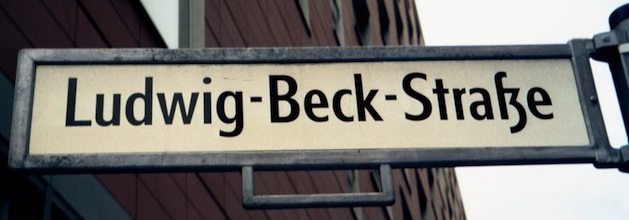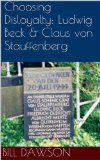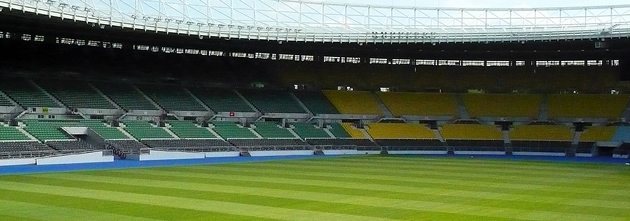I have to be honest with you: I really look down upon soccer (football) hooliganism and I don’t understand the level of hysteria that often occurs at (and, especially, after) soccer matches in parts of Europe and the UK. But I have enjoyed reading about this kind of hooliganism in Vienna during the Nazi era:
On November 18, 1940, some 52,000 fans jammed into Vienna’s soccer stadium in the Prater for a game between Vienna’s Admira and the German champion Schalke 04. The stadium crowd was unruly and ready for trouble. And trouble, political trouble, there was aplenty, despite a massive display of uniformed and plainclothes police and the presence of an impressive array of Nazi brass led by [Baldur von] Schirach and his wife. Let a German player commit a foul, or worse, get away with it, and fans’ anger exploded into anti-German, even anti-Nazi, expletives. As the [Neues Wiener Tagblatt] noted, the crowd ignored Austrian infractions, or worse, cheered them. It didn’t help that Schalke played a tough, even brutal, brand of football. And when the referee disallowed Admira’s go-ahead goal after the teams were tied 1 to 1, the crowd exploded with soccer war style fury. Fans grew totally out of hand when an Admira forward headed the ball into the net, and the referee called that goal back too and the game ended in a tie.
…
Just how serious was the riot? The Gestapo cabled uncertain reports back and forth from Berlin, suggesting that they would need 10,000 police to pick out ringleaders of so large a mob. What’s more, even with the sizable contingent of police on hand that day, nobody was around when so-called hooligans smashed the window of Schirach’s limousine and slashed its tired. Soccer would remain a Gestapo problem for the rest of the war; especially when, seven months later, the Viennese got revenge of a different sort. Before 90,000 fans in Berlin’s stadium Rapid cannonaded Schalke 04 into submission. [p. 182-3]
That’s from Thomas Weyr’s excellent book, The Setting of the Pearl: Vienna Under Hitler (Amazon US, UK, CA, DE [english]). Weyr later quotes a witness, Kurt Neubauer:
I was at the Stadium when Admira played Schalke 04 and yelled my head off at the Piefkes. Soccer gave you a chance to protest. [p. 226]
(Piefke is an Austrian derogatory term used against Germans … to this day!)
I’m interested in the topic of sport as one of the very, very few forms of public protest available to Germans and Austrians under Nazism. The Austrian expert in this arena, according to the results of my web searches, appears to be the historian Dr. Matthias Marschik. He has an article, Between Manipulation and Resistance: Viennese Football in the Nazi Era, which I’d love to read but appears to be available only after payment.
The Viennese family into which I married supports the FK Austria Wien football side, as opposed to their bitter rivals, SK Rapid Wien, so I naturally find FK Austria Wien’s history particularly interesting. This is especially so since they were the Vienna side that seems to have suffered the most after the Anschluss by virtue of the fact that they were the team most associated with Jewish people. I found a very interesting article, unfortunately only in German, titled Fußball unterm Hakenkreuz (“Football under the Swastika”). The article’s authorsinterviewed the son of FK Austria Wien’s pre-Anschluss club president, Dr Emanuel Schwarz, himself Jewish. After the Anschluss, Dr Schwarz was, of course, unceremoniously relieved of his duties and he wisely began seeking an exit visa. His replacement as the head of the club, an SA Sturmbannführer, began his new duties by taking away one of Dr Schwarz’s trophies. The Schwarz family managed to get it back after the war.
According to the article (my translation),
A large portion of the club’s management had to escape Austria after the Anschluss. Robert Lang, the club manager, escaped to Yugoslavia, but was later captured there by the Nazis and murdered. President Schwarz was able to stay for a short while because he was, for a time, protected by the fact that he married a non-Jew; he stayed in Vienna only to await permission to travel to the USA. As this was not forthcoming, he eventually fled to Bologna, thanks in large part to his contacts within Italian football. With help from the FIFA president Jules Rimet, he received permission to emigrate to France in 1939. He went underground when the Germans invaded France. … The later national team manager Walter Nausch and Karl Geyer left Vienna with their jewish wives.
Amazingly, the team survived during the Nazi years, but wasn’t very successful, never finishing higher than fourth in the Gauliga Ostmark, as the Austrian league was called during the Nazi era. More amazingly, “FK Austria Wien” appears to be the only institution in the “Ostmark” to have retained the word “Austria” in their name.
Photo credit: the lead photo in this article shows the inside of Ernst-Happel-Stadion in Vienna. It is licensed under the Creative Commons Attribution-Share Alike Generic 2.0 license. Attribution:




